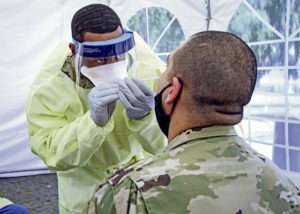
Army Medicine Europe maintains a robust COVID testing and reporting process, ensuring the health and safety of the entire military community across the European theater. At the same time, Army health officials maintain open lines of communication with host nation public health officials responsible for tracking COVID cases.
According to Army health officials, the COVID reporting process in Europe has matured over the past several months and has proven to be an effective tool in providing military leadership an overall picture of how the epidemic is impacting the DOD population in Europe.
“There are multiple mechanisms and systems in place to ensure senior leadership at MEDCOM and USAREUR are promptly notified about positive COVID cases,” said Col. Scott Mower, force health protection officer for Regional Health Command Europe. “These processes have grown better over time and we are continuously searching for ways to further improve them.”
“The reporting of this critical information through operational channels allows senior Army leaders in Europe to make better decisions when it comes to force health protection of the overall military population.”
Army health officials emphasize that maintaining close relations with the host nation medical offices is critical.
“The Departments of Public Health and the Public Health Emergency Officers at RHCE clinics are at the tip of the spear in executing these vital reporting missions,” Mower added. “The PHEOs work closely with their German counterparts at the community level to ensure COVID cases are reported in a timely and accurate fashion. They also immediately alert installation leadership when new cases are discovered.”
“COVID is, by regulation, a reportable medical event and must be inputted into an electronic disease reporting system just like other serious communicable diseases of public health interest,” said Mower. “The bulk of the COVID reporting work is being done by MTFs and their Departments of Public Health. They are the true worker bees in executing this mission.”
Reporting COVID cases to German health authorities is handled at the local level by each of the respective Army health clinics.
“Army medical treatment facilities from each respective military community across the region submit routine COVID reports to their local German Public Health office (Gesundheitsamt),” said Dr. Robert Weien, public health emergency officer for U.S. Army Garrison Rhineland-Pfalz. “Here in Rhineland-Pfalz, we submit our reports to the local German Public Health Department on a daily basis.”
When it comes to COVID reporting processes across the theater, there is no one-size-fits-all approach and each garrison does it differently, according to Col. (Dr.) Jon Allison, chief of preventive medicine for MEDDAC Bavaria.
“The reporting process and timelines vary from installation to installation depending on the local German Gesundheitsamt,” said Allison. “For example, the COVID-19 total positive numbers for Grafenwoehr are sent to the Neustadt (Weiden) Gesundheitsamt and the total numbers for Vilseck are sent to the Amberg-Sulzbach Gesundheitsamt. This is done on a weekly basis with the assistance of the community health nurses.”
Allison says that one of the benefits of Germany’s decentralized local health department (Gesundheitsamt) system is that it allows for the development of close personal relationships between the local clinic healthcare team, and their local German health care department.
“Having a transparent and mutually supportive relationship removes potential barriers and fosters a healthy overall climate between military and local community public health officials,” said Allison. “We both value and rely on those relationships to help keep our military community safe and to ensure we are complying with host nation reporting requirements.”


